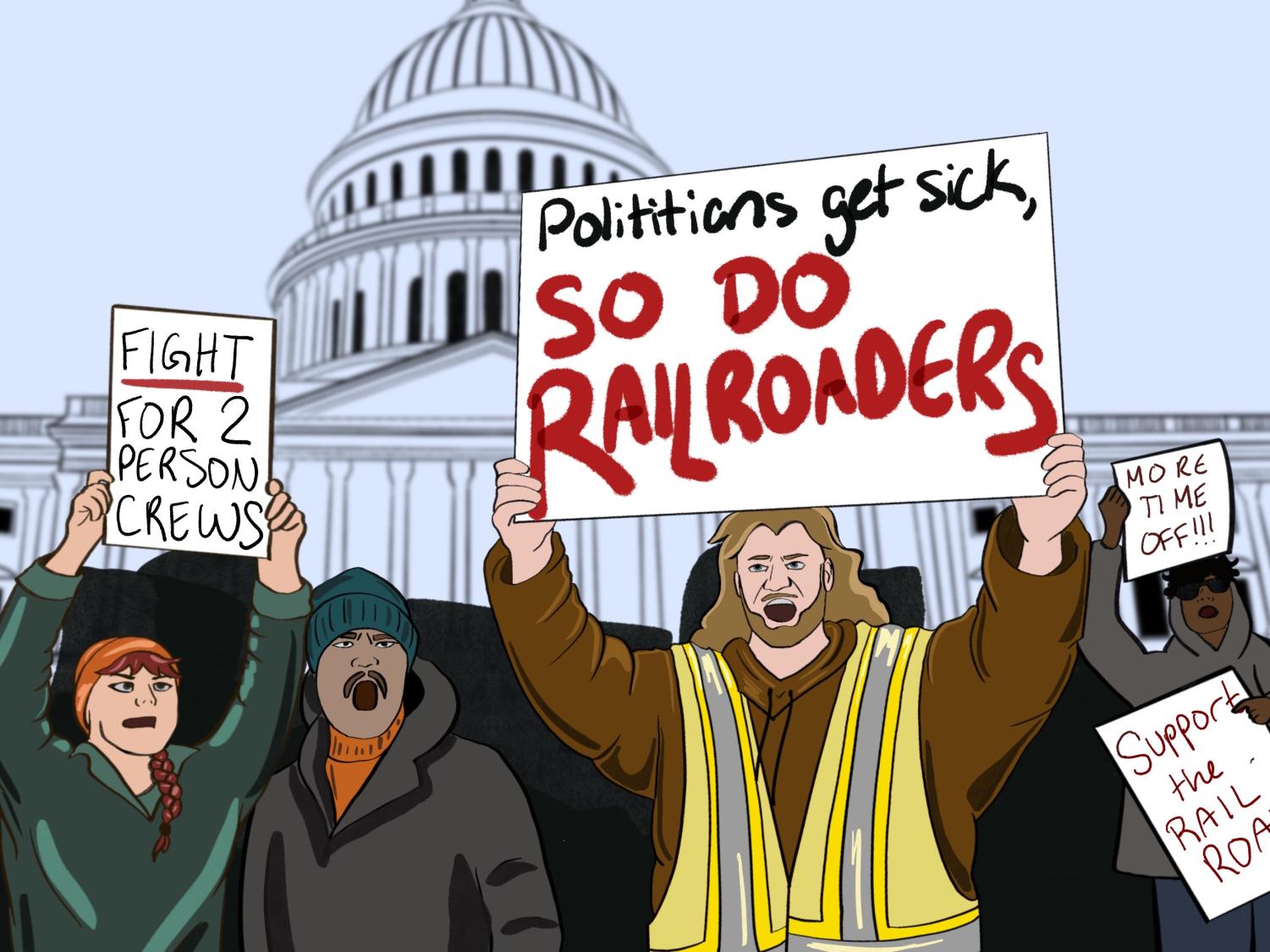Labor and the lifeblood of America
January 27, 2023
Steady, rhythmic thumping fills the air. It shakes the ground and resonates like a heartbeat that grows louder until its all-consuming thrumming crescendos to a climax as the train passes by and fading back into the backdrop of our everyday life.
On December 2, President Joe Biden signed a bill instating a resolution which forced the rail unions who had been negotiating for a list of demands including an increase in allotted sick days and pay increases, averting a potential strike but removing the agency from the workers to negotiate on their terms before the busy holiday shopping season.
Transporting valuable resources across the length and breadth of its larger body, America’s railways act, in many ways, like the blood flowing through the veins of a living organism. The wellbeing of the country is dependent on the free and constant transport of goods along its railways and through its ports, but what if America suffers a heart attack?
Advertisement
These arteries are reliant on a round-the-clock staff of professionals to maintain the tracks and machines that keep America running. However these workers have historically been treated less than favorably in the past by institutions; attempts to organize large scale efforts to ensure safe working conditions and adequate pay have been cracked down on at times by employers and other times through governmental channels to prevent them from using the ultimate tool available to workers, the organized strike.
Tabitha Tripp is the wife of a railroad worker and an active member of Railroad Workers United (RWU), a multi-union organization which helps to facilitate organizing rail workers across the country.
“Being a part of RWU, I got to hear from other crafts and the things they were going through,” she said. “They were literally calling into the meetings from their job because they don’t get days off. They are literally on call 365 and 24/7.”
Tripp said one of the major issues with the railroad industry, namely the unforgiving nature of their scheduling, makes it difficult to maintain a healthy personal life and leaves the industry vulnerable to shocks like sickness affecting the workforce.
“They didn’t mandate a vaccine, even though they’re federally regulated employees. So most of the guys, when COVID started going around, there were entire gangs of people that were completely out sick,” she said.
According to Tripp, much of congress only allowed the bill to be passed as it stands without adjusting it to account for the inordinate amount of stress it puts on rail workers because they don’t understand the jobs they are legislating over.
“It makes my blood boil,” she said. “Do they understand that my husband is standing out in the frickin’ nasty rain today making sure that the track is working properly?”
Advertisement*
Before Congress and the President stepped into the negotiations, the rail unions had reached an impasse with their employers and were gearing up for a large-scale strike, which could have reduced profits across the economy by an estimated $2 billion per day according to her.
Tripp said this potential should have government representatives looking out for the interests of the workers that keep this machine running, and the lack of attention paid to the workers frustrates her.
“It’s so disappointing that elected people in the highest branches of government don’t understand what they do,” she said. “If these guys can shut down the economy, maybe they’re worth their weight in gold. They don’t understand, they don’t empathize and they don’t sympathize.”
According to her, an estimated 120,000 direct members and affiliated workers were represented at the negotiating table and the decision by the government to prioritize moneyed interests over the needs of workers is detrimental to the overall health of the system.
“I’m really, really worried. I’m worried that the largest railroad companies have congress in their pocket and the unions are just like, ‘oh crap.’ We were trying to negotiate in good faith, but the railroads didn’t even show up. So why didn’t congress push so it was actually fair bargaining,” Tripp said.
While the contract forced on rail unions has averted a strike, it has only kicked the proverbial can down the road, she said. The contracts are set to expire in two years, forcing the unions to go back to the negotiating table as early as January, despite not even having a full, unedited contract distributed to the workers yet.
“It was decided that the rail companies would distribute [the contract] and would pay for printing to distribute the copies, so there’s going to be over 60,000 copies between all the unions involved,” Tripp said.
A complicating factor in these contracts getting distributed is the fact that there are a large number of contracts all dedicated to the agreement between employers and the different professions involved in keeping the railroads running, according to her.
“There’s maybe nine or 10 different contracts for each railroad,” she said. “If you’ve got us fractured in this many different spaces and places, we can’t communicate with each other, and that was the goal. If you disenfranchise your working class to the point they can’t communicate with each other, then they can’t ever gain traction for a powerful strike.”
Luke Heron-Titus, co-chair of the Southern Illinois Democratic Socialists of America, said recent trends in the political landscape seem oriented toward a surface-level support for labor organizations while remaining incapable or unwilling to address the needs and concerns of labor unions.
“The Obama administration wasn’t able to pass the Employee Free Choice Act (EFCA), even though they had a blue Senate and a blue House,” Heron-Titus said. “The Protect the Right to Organize (PRO) Act was a big incentive, something that the left has talked about and Democrats kicked around. But that did not happen.”
EFCA was introduced to Congress most recently in 2009 and was intended to make the joining of a union easier and enforce the ability of labor unions to make demands of employers. The PRO Act, which passed the House in 2021 but has yet to pass the Senate, would provide protections for unions on a national level to prevent members from being retaliated against and allow unions on encourage participation in strikes.
A series of essays written by the Department of Labor (DoL) detailing the history of labor relations in the U.S. goes into detail on the various acts and legislation levied against unions with the ending of World War II as the Red Scare came into full swing. It was from this wave of anti-union and anti-collectivism sentiment that the Taft-Hartley Act was passed, imposing new limits on union power.
“Denounced by unions as a ‘slave-labor act,’ the Taft-Hartley Act outlawed closed shop, jurisdictional strikes and secondary boycotts. Union power in emergency disputes, political contributions and negotiated health and welfare funds were curtailed,” according to the DoL.
The bill also brought about the rise of Right to Work legislation, state laws ensuring the right of workers to choose whether to join unions when employed, disincentivizing union membership and reducing union numbers.
Around the same time, the Railway Labor Act was passed, giving the government the power to step into negotiations and perform arbitration for air and rail employees or, as was the case for the Air Traffic Controller union strike, to dissolve the union and break a strike altogether under the premise of keeping valuable infrastructure functioning.
“Congress has used [the Railway Labor Act] to intervene in strikes in the past, but I think, in terms of what’s happening now, a lot of people are shocked at how early the current intervention is,” Heron-Titus said.
Because of the entrenched nature of the government’s ability to step into rail and air negotiations, Heron-Titus, like Tripp, believes the best way to go about creating a better environment for the contract negotiations for these workers is to install members in Congress who are sympathetic to the issues they face and shifting the focus of labor organization from ideological arguments to utilizing the economic needs of lower class workers.
“There’s an economic basis of the labor movement by engaging in economic struggle,” he said. “And then the economic struggle reaches such a fever pitch that they need to also incorporate the political struggle into their economic struggle and I think that’s kind of backwards.”
He also said he believes increasing funding to the National Labor Relations Board (NLRB), a government entity established to help workers, unionized or not, to advocate for their interests before a professional, third party government entity and resolve disputes.
“We have to get the NLRB fully funded,” Heron-Titus said. “I think it’s been really opportune for Amazon and Starbucks to have the NLRB be more friendly toward them.”
The fallout of the contract will likely not be made known in its entirety for months or years to come, but the immediate effects on the rail workers and their families has led to an impact on morale, which can quickly become dangerous according to Tripp.
“They’re making sure that track contains the train that’s on it and it doesn’t go offrail,” she said. “Because if it goes off, you’ve got bomb trains, you’ve got all kinds of chemical spills, and it’s [my husband’s] job to stand out there in the rain and make sure that track works.”
As of January 10, the heads of the Illinois executive and legislative branches, Governor J.B. Pritzker, House Speaker Jehan Gordon-Booth and Senate Majority leader Kimberly A. Lightford jointly expressed support for a bill currently making its way through legislation to ensure Illinois workers as a whole, not just rail workers, will have mandated and protected paid leave.
The bill, Illinois Senate Bill 208 is currently set to include a minimum of 40 hours of paid time off (PTO) per year with room for employers to add more. It will guarantee the leave begins to accrue the first day of employment and allows the PTO to carry over each year.
Despite the abundance of confusion and lack of clarification for the rail workers at the moment, Tripp said it is still better to have large union organizations advocating for the interests of the laborers.
“I have a lot of respect for unions, if they’re able to actually stand tall in the face of corporate power,” she said. “I appreciate that they are there to negotiate on the workers’ behalf, but my concern is that it took us three years to get to this pivotal point and yet I still feel like they caved. When push came to shove, they buckled.”
Advertisement



Bill Kazda • Feb 1, 2023 at 8:28 am
Well done article and labor needs to be represented better in print. Thank you for your efforts!